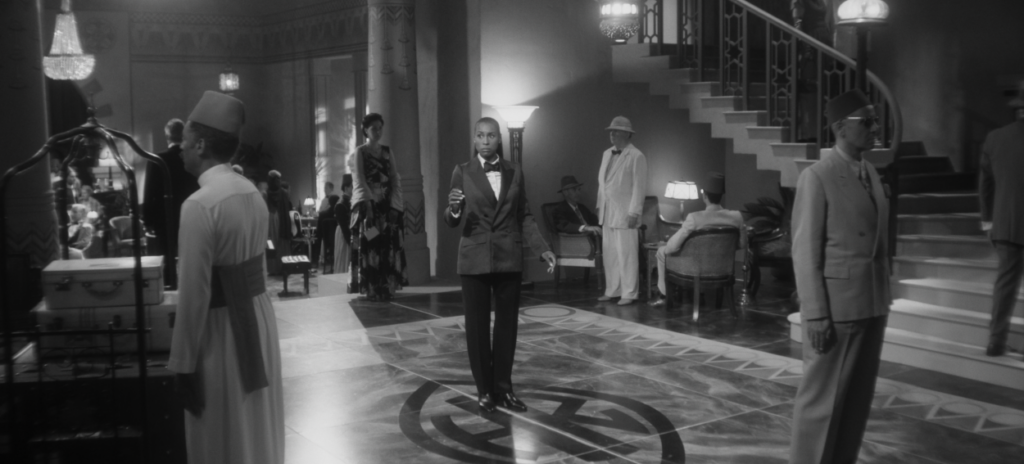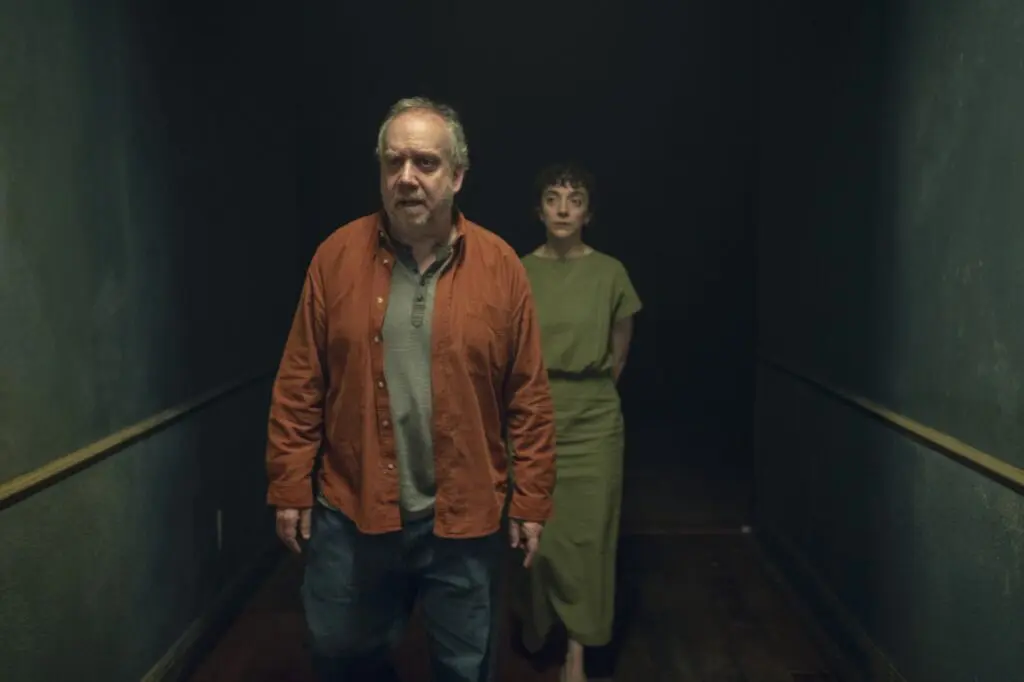You have to wonder if the reason Black Mirror isn’t very good anymore is that the horrifying digital future it once imagined is now our reality. It’s hard to make speculative sci-fi when you’re not speculating about “what-ifs” but counting down to painful inevitabilities. Season 7 feels a bit like that. It has the usual dystopian bent, and its pitch-black concepts and tech-terror gimmicks aren’t quite everyday just yet, but pointing out, say, the predatory nature of subscription services feels less like capturing the zeitgeist and more like circling the drain.
Still, this seventh season promised a return to form – though it seems to have interpreted “form” not as a quality metric but as a signifier of overwhelmingly cynical bleakness – and has delivered six new episodes (one of them being the first direct sequel in the show’s history) to achieve this. And I’m here to break them all down and determine which (if any) are worth paying attention to.
Black Mirror Season 7, Episode 1 — “Common People”
“Common People” is one of those Black Mirror episodes that has you anticipating a twist that never arrives. And that’s the point. The only freedom from your subscription services is death.
Mike (Chris O’Dowd, Juliet, Naked) and Amanda (Rashida Jones) are an everyday couple with ordinary jobs who think their inability to conceive is the worst of their problems. But not quite. Amanda is diagnosed with a brain tumour that only 18 months ago would have proved fatal. But in the pioneering tech start-up era, there’s an outside-the-box solution – to replace the cancerous tissue with a synthetic version that, problematically, requires an overpriced subscription service to keep active.
It’d be too easy to draw comparisons between the tech company here, Rivermind, and, say, Netflix. Besides, Rivermind has more in common with the pharmaceutical companies that jack up the price of life-saving medication. What “Common People” is doing is taking the perils of an ever-expanding entertainment service that keeps coming up with excuses to charge you more – for 4K, for more screens, for no ads, etc. – and applying that model to something much less innocuous than film and TV. Before long, Amanda’s basic package won’t let her out of the county, causes her to sleep for 12 hours a day to power up the company’s servers, and has her blurting out contextually relevant advertisements without her knowledge.
Each new tier offers freedom from these limitations but also commands a higher price point, leading Mike down increasingly dangerous paths to drum up the funds – namely a live-streaming service where people pay to watch the desperate humiliate themselves by drinking urine, putting mousetraps on their tongue, and pulling out their own teeth. One thing leads to another, and Mike and Amanda both lose their jobs, with Mike’s sponsored self-harm falling into the realms of nebulous private shows for wealthy donors, the details of which we’re mercifully spared. Eventually, Mike suffocates Amanda with a pillow while she garbles out another ad, and then locks himself in a room with a box cutter for reasons we can probably intuit. Talk about a bleak start.

Chris O’Dowd and Rashida Jones in Black Mirror Season 7 © 2024 Netflix, Inc.
Black Mirror Season 7, Episode 2 — “Bete Noire”
“Bete Noire” continues the bleak approach by building to a conclusion that is, essentially, “the bully wins”. But I feel like this is a consequence of the episode not knowing where to go after establishing an intriguing high-concept premise.
That premise provides a tech explanation for the logical extremes of gaslighting, arming the put-upon school bullying victim with the power to take revenge on her oppressors. The science is very woozy in this; a “quantum compiler” is mentioned, and a remote disguised as a necklace allows for instantaneous reshaping of reality. But the story is less about the particulars and more about the macro dynamic of the once-queen-bee being professionally and personally ruined by her grown-up former victim, about whom she started a vicious rumour in school.
Maria (Siena Kelly) is the well-liked head product designer of a confectionery company who begins to feel like things are amiss when the school “freak”, whom she hasn’t seen for a decade, gets a job at her company. Verity (Rosy McEwen) has had something of a glow-up, but that doesn’t quite explain why everyone seems to be siding with her in a string of office conflicts starting with a disagreement over the name of a chicken shop chain and escalating to feeding the Hindu CEO beef gelatin and stealing someone’s almond milk. When Maria, who has a nut allergy, sees herself on CCTV drinking the milk seconds after seeing Verity do it, she knows something is wrong.
“Bete Noire” doesn’t know where to go from here, hurrying through a resolution in which Maria confronts Verity, who explains she has been using quantum computing to gaslight her former tormentors into suicide. Maria resists by stealing a gun from a police officer who comes to arrest her and shooting Verity in the head, then using the necklace remote to become the empress of the universe. Perhaps she never quite outgrew who she was in high school.

Ben Bailey Smith in Black Mirror Season 7 © Netflix, Inc.
Black Mirror Season 7, Episode 3 — “Hotel Reverie”
Hollywood’s weaponization of nostalgia is taken to a technological extreme in “Hotel Reverie”, which imagines the future of filmmaking being the transplantation of present-day actors to a monochrome past. Issa Rae (Vengeance) plays Brandy Friday, a stage actor looking for her Casablanca, who is cast to revive a Golden Age classic alongside Emma Corrin’s (The Crown; Lady Chatterley’s Lover; My Policeman) Dorothy.
The trick is that Dorothy only exists in the original, which has been rejigged into a very extreme virtual reality simulation that Brandy’s consciousness is beamed into Matrix-style while a coterie of technical support staff and studio executives – including Awkwafina (Quiz Lady; The Little Mermaid) and a brilliant Harriet Walter (Herself) – watch on. Brandy has to stick to the script, since too much variance will cause the simulation to collapse. However, an on-screen romance with Dorothy’s character, Clara, very quickly becomes more real than a simple screen performance.
This through-line of authentic love in a sea of fakery is compelling, but despite the almost feature-length runtime, it nonetheless feels a bit undercooked. This is worsened by frequent forays back into the control room, where various technological bugs keep imperilling Brandy in increasingly overwrought ways. It’s like nobody noticed that the question of whether Brandy would leave the simulation and abandon her love of her own free will is more compelling than the question of whether she’ll get trapped there through no fault of her own. This is a striking-looking episode with a compelling gimmick that uses the juxtaposition of modern tech with aesthetic classicism well, but it’s also one that puts its sci-fi leanings ahead of its moral ones.

Issa Rae in Black Mirror Season 7 © Netflix, Inc.
Black Mirror Season 7, Episode 4 — “Plaything”
“Plaything” is the one episode in this collection that stands out, and not for good reasons. Even at its worst, Black Mirror tends to hit on something quite prescient, but this – mercifully short – episode gets almost every aspect of its story construction wrong, from the rehashed underlying point to the overall tone. The central thesis of “the AI is alive” is so commonplace in sci-fi that it barely warrants an inclusion here, even in this semi-novel form.
Peter Capaldi (The Devil’s Hour; Criminal Record) plays Cameron, an old man who is arrested for petty theft, only for the police to discover he’s the prime suspect in a years-old unsolved murder. For some reason, he killed a man, chopped his body into pieces, and stuffed the remains in a suitcase. The victim has yet to be identified, and two cops, played by James Nelson-Joyce and Michele Austin, believe that Cameron can do that. But he has a wilder story to tell.
That story involves Colin Ritman, Will Poulter’s (War Machine; Midsommar) character from Black Mirror: Bandersnatch. In his youth, Cameron was a video game reviewer who was invited to a one-on-one meeting with the famously neurotic programmer and introduced to his latest creation – the first ever entirely digital lifeforms, extremely basic-looking blobs of pixels called “thronglets”, who together form “The Throng”, an artificially intelligent hive-mind. Cameron doesn’t understand the rules of the game that Ritman has designed as a cover for their existence, because there aren’t any. The Throng is alive, to be observed and communicated with and hopefully understood, and over the years, Cameron became their caretaker, frequently strung out on hallucinogenics to continue being able to parse their odd language.
None of this works. Cameron’s story is full of logical holes – he was entirely consumed by his devotion to the Throng yet somehow kept being able to afford all of the latest video game tech he was using to gradually upgrade and improve his setup – and builds to an extremely silly conclusion wherein it’s revealed that Cameron has merged with the Throng and got himself arrested to infect the nation’s digital infrastructure, using it to broadcast a signal that “upgrades” humanity. Capaldi’s performance is serviceable but off-puttingly eccentric and broad, complete with a ghastly wig. A real misfire.

Will Poulter in Black Mirror Season 7 © Netflix, Inc.
Black Mirror Season 7, Episode 5 — “Eulogy”
“Eulogy” is the best episode of the season by a country mile, perhaps because it’s the only one that actually focuses on technology as an avenue for genuine human emotion rather than horrifying gimmickry. It centres on memory, which isn’t a new subject for Black Mirror, but explores it carefully and creatively, intending to remind us that not everything is precisely as we recall it.
There is a tech hook, obviously, which is the idea of being able to physically explore fuzzy older memories with the aid of physical prompts – in this case, photographs. Paul Giamatti (The Sons of Sam: A Descent Into Darkness; Gunpowder Milkshake) plays Phillip, who is contacted out of nowhere by a company called Eulogy that is intending to create a “full spectrum memorial” for a woman named Carol, who has recently died. Phillip has been identified by Carol’s daughter as someone who might be able to provide some meaningful insight into her life, but for him, the relationship is an extremely touchy subject.
With the help of a virtual guide who later turns out to have been modelled on the personality and memories of Carol’s daughter (Patsy Ferran), Phillip digs up old photographs of his years with Carol and delves in and out of the dioramas they depict, trying to fill in the blanks by recalling the precise circumstances surrounding each snapshot. He has a very one-sided view of how their relationship ended, but throughout the episode, coached by his guide, he gradually begins to realize that there’s much more to the story than he has allowed himself to remember. The closing shot of a damp-eyed Phillip finally recalling Carol clearly enough to see her face for the final time is a beautiful payoff.

Paul Giamatti and Patsy Ferran in Black Mirror Season 7 © Netflix, Inc.
Black Mirror Season 7, Episode 6 — “USS Callister: Into Infinity”
The first direct sequel in Black Mirror’s history turns out to be a perfect example of the cynical rinse-and-reuse culture of contemporary entertainment. “USS Callister: Into Infinity” recycles its predecessor’s ideas and gimmicks so they come out faded and worn. It’s not bad, but for this to be the centrepiece episode of the season – another one that runs to almost feature-length, I might add – feels like a shame, as well as being pretty ironic.
The setup and general vibe of “USS Callister” are retained, at least. The whole thing’s more explicitly comedic rather than offering up existential doom and gloom, and the plot picks up smoothly from where it was left off, though with Jesse Plemons’ (Windfall; The Power of the Dog; I’m Thinking of Ending Things) Robert Daly already dead and his inevitable return mandating the enthusiastic use of deus ex machinas aplenty.
Nanette (Cristin Milioti, enjoying a career renaissance thanks to The Penguin) is now the captain of the titular ship, which continues to be adrift in the simulated space of Infinity while various real-world scandals threaten to unseat the VR game’s CEO, James Walton (Jimmi Simpson). The plot plays with the idea of freedom most of all, which makes its final twist deeply ironic – the ship’s ragtag crew end up inside the head of Nanette, just when it looked like she had earned them all a more meaningful reprieve from the game.
It’s all fine, and there are definitely some funny moments, but it feels almost anti-Black Mirror in its sequel trappings. If this is the direction the show is heading in, forming a more explicit continuity to rehash its most popular existing ideas, then its future could be even bleaker than the ones it has imagined for its characters over the years.




